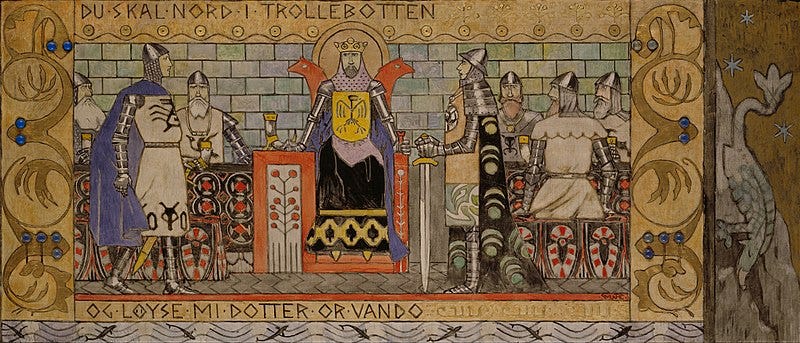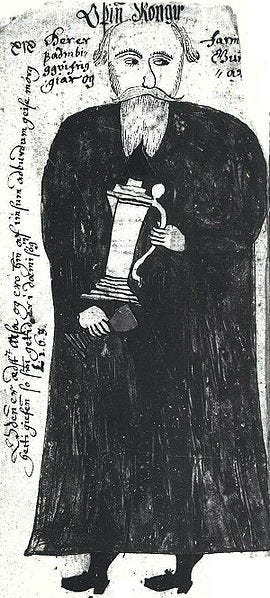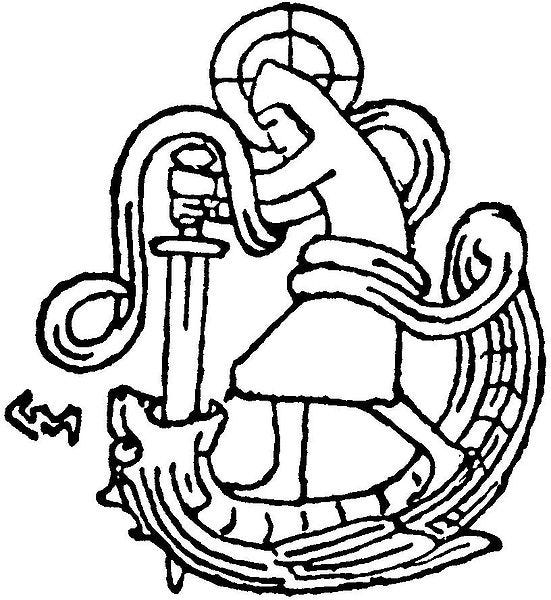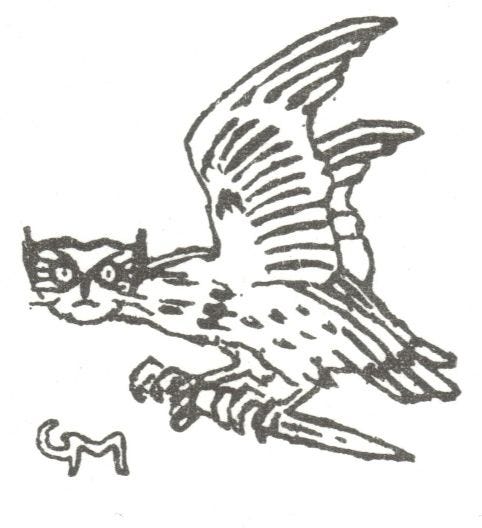In the age of intelligent machines, why does the Galois redaction compose its essays archaically? Archaically, that is to say, by the sheer force of human information processing. Even more, Galois, as far as the current era, its mood and magnetic forces still allow, is committed to the strict use of his biological neural networks, not only to compose, but to research, intersect, examine, translate, summarize, invent and, in general, think. All of which is already, on the part of a human, archaic and soon will, probably, be downright obsolete.

Not to use the tools born of the great odyssey of science and technology is, at minimum, to display affectation - the pretense and artificial display of maintaining outdated methods. A ridiculous conservatism, some would argue. With no regard for the cumulative millennia of expended nerves, blood and brain spent developing progressive machines, finally computational ones, whose effects have freed each new generation from the burden of another drudgery. A kind of refractory autism, that of a post-Gutenberg revolution copyist, of a teenager, secret Friday-night video-game player, who in class makes it a point of honor to do all his mental arithmetic in his head.
Yet, the printing press did not penetrate every cottage, to replace there something. Quite the opposite, it catalyzed the massive training of minds that led to the advent of the computer scientist, the processor-designer, and silicon-based computing centers. It has opened up an ascending movement, where minds and machines, necessarily, progress together, reciprocally perfecting each other.
Generative artificial intelligence ushers in an absolutely new era, which clearly threatens human mental forces with dereliction and desuetude. But how, both intelligences complement each other!, already protest the avant-gardes of the future and the chip peddlers. By using an Archimedean lever, your physical forces are magnified many times over. The result, the total work expended, is incommensurably greater. The strongest of colossi is exceeded by the average stature when equipped with the proper apparatus, thereby depriving the colossus of all comparative advantage, other than decorative, on an outmoded note. There remains, in a special corner of the universe, the Guinness Book of Records, and Olympic contests, a niche market for the antiquarians of physical strength. In short, the lever does indeed complement human force, but also dispenses with any lustre in the matter, except for the display. The utterly unsentimental demands of the social machine and the productive machine - in a word, of progress - ultimately care nothing for the author of the act, as long as the force is deployed. The colossus can recycle itself into mannequin work.
We are inclined to think that the analogy holds entirely when considering the neuronal counterpart of the lever. The average translator endowed with an internet connection is more accurate, more productive and more multilingual than the most erudite of scholars polished by the ages, when it comes to the majority of materials - say, with the minute and shrinking exception of the most sophisticated. The same goes for summarizers, exegetes and quill-drivers. Catchphrases and headlines coiners, office strategists, advice-givers or speech, ghost- and scriptwriters. As with physical strength, the machine couldn't care less about your name or the glow your remanent instinct for survival and distinction would like to associate with it. If you score very high in numerical and verbal processing, you will soon be impressing no one but yourself. Because your results, which you know are sincerely natural and naturally high, are already by far dwarfed by the minimal, routine efforts of a naturally more robust and infinitely scalable infrastructure.
As with physical force, the great tendency at work, the irresistible drive of progress, prompts our species - that of the consumptive majority or mass society, the infinitesimal top few having almost already branched off onto a new branch of the phylogenetic tree - to accommodate its averaging out, or so to speak, if we subtract from the term its connotation because the point is to argue, rather than polemicize, its mediocritization in intelligence. Yes, human and machine intelligences complement each other, and their conjugated output could very well anonymously surpass any cognitive abilities hitherto conceivable. But this is at the expense of the human share in these capabilities: if you don't use it, you lose it.
Repeat several times if you have to, and remember: if you don't use it, you lose it.
This is, organically, biology. The principles are many millennia-old and now well known to competent neuroscientific services. At the cellular level, a cortex of specialized units is activated by the rhythm of their usage. Discharges are electrical. Electricity runs along the axons, those long wired extensions of nerve cells, whose myelin sheaths make them look just like high-voltage cables. The arithmetical sum of activations on axon endings afferent to a subsequent cell determines signal transmission. At the axon-neuron junction, the electrical signal more precisely converts into a chemical signal, and we reach the molecular level. A set of messenger molecules, the neurotransmitters, trigger the opening of ion channels across the membrane of the recipient cell, and the difference in charge between the latter’s intercellular and intracellular milieu imparts the electrical discharge to it. The recipient cell is activated. Electricity, chemical bridges, electricity, etc. Billions and billions of neurons, their aggregates in lobes and crowns.
We said neuroscience was highly evolved. Despite obvious progress, many mysteries persist: consciousness, emotions, abilities, memory, will - and, of course, language learning. One thing is however certain and known to the lowliest biologist. The more active a brain function, the more efficient it becomes. Conversely, an abandoned circuit is lost to excellence. It falls out of order. The bed of the electric stream narrows into a creek and eventually dries up. (Deshpande & Wang, 2022) The phenomenon or biological capacity underlying this reinforcement or deprecation of circuits is cerebral plasticity. Axons have the power to reorganize their terminations, so as to connect with one recipient neuron or another. This plasticity enables learning, that is, the improvement of a capability, by reinforcing a specific neural circuit. The brain learns Old Norse or, say, arithmetic. But conversely, the exercise of learning improves plasticity: the more the brain learns - of something - the more plastic it becomes, and quicker to learn the same kind of thing, or whatsoever.
In short, practice enhances plasticity, plasticity enhances practice, and so on - we are indeed quite a machine! Understanding a little bit of the mechanics involved already indicates what needs to be done.
But we are wandering. We are giving a long answer to the question you did not and will not ask. Not because it does not cross your mind, but because it doesn't make sense, and will less and less, to ask it. You might still, for a moment, wonder in your inner self who composed, Galois or the machine, but seeking confirmation from the author, the machine, or both (since you would be postulating the possibility that they might be one and the same) would entail being better able to trace the origin of the reply provided, than that of the productions to which the question pertains. In short, a little like emotionally asking a probabilistic generator: are you truly sincere? And the foreseeable progress of machines will further blur the dividing line, your reliability - and that of the machine - to detect it will disappear almost perfectly, thereby finishing off the deprecation of the question - and that of authorship.
Please note that Galois will not ask his reader if he is human either, and as you understand, he could not care less, since he is in a position to demonstrate to no one the virtuosity, depth, erudition or pertinence by which he might have wished to illustrate himself. And if he lays down his arms in defense of talents that you might have attributed to him if you were in a position to reliably attribute “his” productions to him, he doesn't even ask for the benefit of the doubt: he would risk receiving from you, as a substitute, the kind of fair words and patronizing fawning a child receives from slightly embarrassed adults, when he has made a nice drawing, it is clear that he cannot be expected to become a new Edward Munch, but no one wants to be less than encouraging. In truth, anyone who doubts that your works are not your own, but hypothesizes, however faintly, that they are produced by calculation, will soon be paying you the quintessential compliment.

Here, a farandole of other objectors, at the opposite end of the spectrum, enters the scene. Word-processing machines will never rival humans! They lack Q, where Q denotes a quality that, in the best-intentioned debates, is still widely regarded as strictly human, such as emotion, creativity, esprit-de-finesse, the je-ne-sais-quoi or its close kin, the almost-nothing. In general, those concerned are retorted as proving, at the very least, blindness to facts, and certainly, a poor capacity for anticipation, typically ascribed to a deficit in scientific background. Attempts are made to enlighten them on the workings, prowess and promises of artificial intelligence, but most often to no avail. There always remains a little something spiritual to be defended for these idealists of human preeminence preservation. They worship, deplore our very 21st-century scientists, a brain in a jar of formaldehyde in a decaying natural history museum amidst a smart city rocketing with flying vessels.
In the absence of weights and measures, these conviction-based disputes can go on forever. Yet, we can try to slip in a small but essential accounting element. As we have said earlier, the human being, in the mundane, majority use of his natural intelligence, has already been replaced - or is imminently replaceable subject to a few machine-world interface tweaks. Moreover, innovation is in full swing. The treatment of its disconcerting exponential acceleration is itself already archived among the platitudes. And the confluence of financial flows towards yield-enhancing automation technologies forebodes the perpetuation and reinforcement of the brain drain fueling the trend. A shrinking caste of precision engineers is perfecting at high output, in the machine room, its own robotization.
Thereby, the share of mundane intelligence soars. The movement is twofold. The machine conquers, and thus trivializes, the complex. Humans standardize, average out, in a word, simplify. The machine's democratic accessibility decisively explains the latter. Artificial intelligence, for its part, does penetrate the remotest cottage. The machine humbles us, it is close to being better than us, in most cases. We have it at our fingertips, we overuse it, and our own capabilities recede accordingly. Here again, financial incentives come into play, and they don't encourage exercise, which calls for voluntary impetus from a certain discipline.
This still leaves the ever more marginal upper end of the Gaussian distribution: the virtuoso exercising his predilection might have embodied that very human something longed for by the aforementioned cantors of some kind of confident humanism. Unlike the mundane performances of intelligence, his spectacle is not subjected to the binary or further discretionary assessments ruling the productive sphere: it would be injurious to pass it by the sieve of Quality of Service. He represents, versus the mass-produced, the limited edition: even if, somewhere down the line, the self-assembly table is to some extent produced by humans, they only intervene insofar as they fulfill their function. They are invariably content with a badge, where the virtuoso had a name, the only thing about him that the merchant sphere - publisher, producer, media or record company - exploited, for want of being able to disentangle and securitize its prowess. In direct line with a very exclusive world of ideas, he used to descend back amongst mortals with an illuminated forehead. Chosen, he was gifted - gifted with a style: he was inimitable. (Here, the anecdotal forgers of history were also virtuosos in their own way.)
Clearly, this hypothesis of unequalled human virtuosity - it suffices that it be expressed by a few, Bach, Ciceron or Hieronymus Bosch - coincides exactly with the disputes over mind-body dualism. If we believe that perfect reductionism, of soul to brain, can ever be mapped, there is nothing but computation up there. Otherwise, we have a soul supplement. The soul is the organ of feeling, inspiration and meaning. It has a great deal of intuition, but is obviously unable to explain positively how it understands what it is saying. Yet it does, while the statistical machine spews out.
The total replacement of human intelligence by the machine therefore has the same debate-producing potential as God, eternal life and the gender of angels.
Not using intelligent machines in every instance requires, thus, discipline. But discipline, like beauty or professionalism, admires itself. After a while, one finds pleasure in it. Is Galois, then, a narcisse of self-perfection? Halfway between an ascetic and one who delights in well-turned phrases? Perhaps a little, like all his era.
You seem to persist in asking yourself the question you won't ask him, that of why Galois bothers to compose and study with his five senses - Galois still regularly writes with a fountain pen, well, at least, sight, hearing and touch. As we said, his motivation here is by no means the cure of results. For his slow, too-human, too-fallible processes would be perfectly counterproductive to that end. Reciprocally, the result-driven motivation, the one that rushes to the automatic translator or answering machine, takes on a productivist perspective: maximizing speed, crossing the quality threshold, fitting into the standard gauge.
Even if it is impossible to know, you can always bet on having a virtuoso within yourself, a human part. In any case, you can indulge in honoring yourself as an end, rather than diminishing into a means. Once extricated from the realm of accountancy, the motives and criteria of your achievements have your own worldview as their yardstick. Galois is its own standard.
Is Galois a Luddite, a helmsman of progress, an enemy of the Enlightenment? If he managed to arouse such suspicions, he stands corrected. Galois marvels at the technologies his time is perfecting. Of scientific pedigree, he is a fervent contemplator of algorithmic elegance. And he could just as well expand on the machine's blessings, its promise of a globally more interessant world, a world magnified.
What he maintains, however, is that he resists, in all situations requiring computational outlay, using the machine in the first place. He first tries to find the solution by himself, feeling his way through the darkness for a while if necessary. The machine can, of course, solve the same problem in an instant. But he would be depriving himself from the exercise. He remembers the well-stocked graduate mathematics textbooks. You don't learn here by reading the solutions, you learn by searching. By searching for a long time. This is where the brain's microcircuits are refined: you compare and contrast, you develop patterns, you progressively master the algebraic material. And he has learned his lesson.
When he wants to write in a foreign language, Galois begins by flexing his strength, giving his best, most genuine effort over an extended period of time, until he achieves a certain satisfaction. Then, he turns to the machine: he converses. He converts back and forth between languages, polishes at length and makes the final judgment. Yes, in a way, Galois derives time and energy from the great general machinery. He diverts them to drive his own little inner theater.
But you learn Old Norse, you are a little like him.
References
Deshpande, Gopikrishna & Wang, Yun. (2022). Noninvasive Characterization of Functional Pathways in Layer-Specific Microcircuits of the Human Brain Using 7T fMRI. Brain Sciences. 12. 1361. 10.3390/brainsci12101361.







